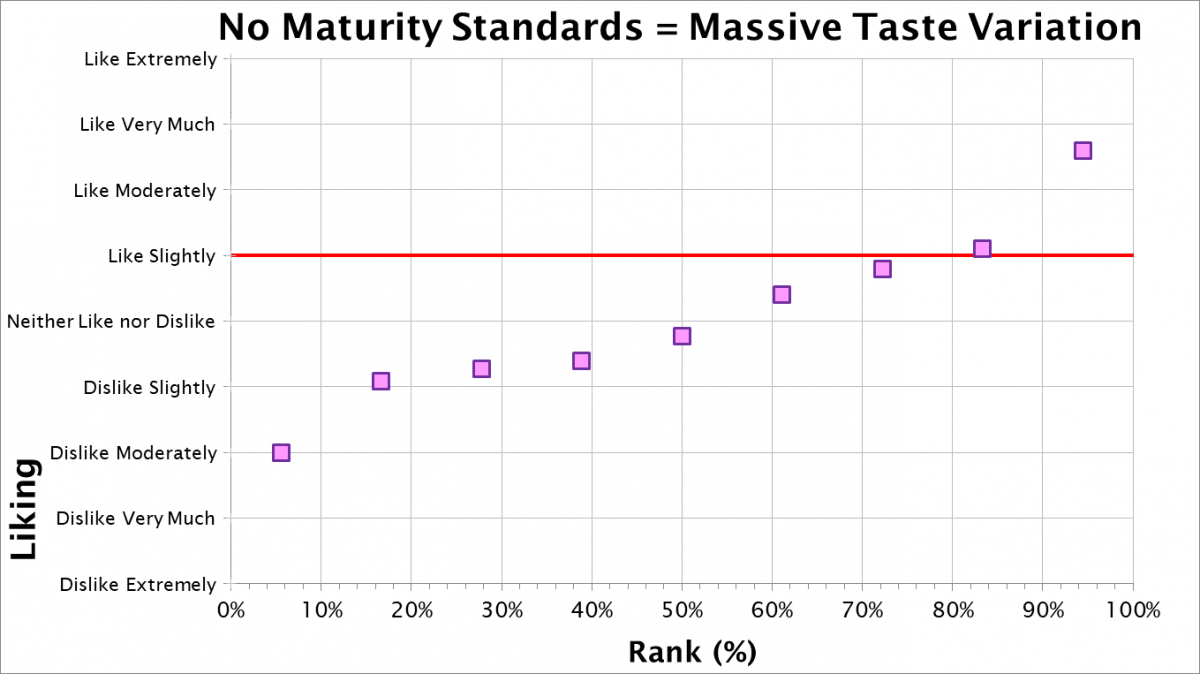Retail analysis carried out by Delytics Ltd in collaboration with James Hutton Ltd has identified a significant opportunity to increase consumer demand for blueberries in the UK.
The analysis revealed extreme taste variations in different samples of the same blueberry variety, which were grown across Europe and purchased from UK supermarkets over a five-month period. The retail samples were analysed to provide a consumer acceptability benchmark for the James Hutton blueberry breeding programme.
 The blueberry variety shown in this graph (which was not bred by James Hutton) has a known genetic potential to deliver outstanding taste as evidenced by the top right square in the graph. However, the analysis showed it only delivered outstanding taste in 1 out of 9 purchases, with 5 out of 9 purchases being disliked. This resulted in an average consumer acceptance of just 44%, with more than every second purchase being disliked.
The blueberry variety shown in this graph (which was not bred by James Hutton) has a known genetic potential to deliver outstanding taste as evidenced by the top right square in the graph. However, the analysis showed it only delivered outstanding taste in 1 out of 9 purchases, with 5 out of 9 purchases being disliked. This resulted in an average consumer acceptance of just 44%, with more than every second purchase being disliked.
Dr Susan McCallum, who runs James Hutton’s blueberry breeding programme, says their retail sampling reinforces the importance of setting minimum maturity standards to ensure blueberries consistently deliver their full genetic potential for taste.
Dr McCallum says, “We know that when consumers have a good eating experience they are more likely buy more fruit, and even pay more for it. However, we also know that a poor eating experience will put them off buying again. The retail data we collected in UK supermarkets shows a really good opportunity for a marketer to create a premium brand focused on good consistent taste. I really believe that when consumers understand what a mature blueberry actually tastes like, they will reject a lot of what is currently on offer.”
Although the James Hutton breeding programme is still in its initial phase, Dr McCallum says they have already identified some breeds that out-perform the consumer acceptability of blueberries currently available in UK supermarkets.
Delytics is providing analyses to assist the blueberry breeding consortium to select new varieties that will meet consumer taste expectations, and is developing maturity standards to help ensure they will do that on a consistent basis. Delytics Managing Director, Mark Loeffen says setting minimum maturity standards is a proven key to ensure fruit will be picked at a maturity that will be liked by the majority of consumers, which will encourage repeat purchasing. Mark says, “I have personally seen consumer acceptability jump by almost 50% in just one season after maturity standards were adopted, with everyone in the supply chain benefiting. Increasing consumer acceptibiity by just 20 percentage points will typically achieve this type of result. The value gain from doing this is very significant.”
Delytics recently completed a project for Hort Innovation Australia to improve the eating quality of Australian table grapes, which included the setting of science-based minimum maturity standards. The project concluded at the end of the 2019/20 season with the highest consumer acceptability in five years. Nielsen Homescan data also showed an average 10.1% increase in volume for Australian table grapes and an associated 5% increase in price, over the same time period.
Mark says, “I have seen consumer demand significantly improve in multiple crops once minimum maturity standards are put in place. The retail analysis we did for the James Hutton Institute shows a substantial opportunity to add more value to the UK blueberry sector with a premium brand that consumers can trust will always deliver great taste.”
